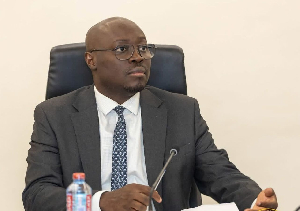Commissioner of Police (COP), Dr Peter A. Wiredu, Acting Director of Ghana Immigration Service (GIS), on Wednesday noted that international migration is a priority on Ghana's developmental agenda.
He said its impact was increasingly being felt in various sectors of the economy and could be attributed to the discovery of oil, stable democratic environment, economic success and significant amounts in remittance transfer from the Diaspora.
COP Wiredu was addressing Regional Commanders and Members of Policy Planning Management and Evaluation (PPME) Unit of GIS, at a capacity building workshop in Accra financed by the European Union (EU).
He said available statistics at GIS indicated that, there had been an increase in people passing through Ghana’s borders and GIS was becoming more diverse and challenging.
“It is our estimation that these demands would assume a more complex dimension when the petro-chemical and gas industries are fully developed,” he added.
COP Wiredu said in September last year, GIS launched its Four-Year Strategic Plan (2011-2015), and in pursuance to that, several activities were on-going successfully to implement it.
He said knowledge and human capacity were critical to implementing successfully any strategic plan, which would be shared widely with stakeholders to empower them through greater awareness, and understanding as well as new skills and capacities.
COP Wiredu said, the key challenge was to invest time and resources in networking and information sharing, as this would pay off by creating knowledge, legitimacy, and understanding of the reasons for change and the likelihood of implementation success.
Ms Daria Fane, of EU Delegation to Ghana, said the Union’s migration policy with non-EU countries was developing over the past few years, which had taken a prominent place in the dialogue and cooperation with third countries in the context of development policy.
She said since the adoption of Global Approach to Migration, Ghana was one of the countries where migration assumed a prominent role in bilateral development and political dialogue with EU; and lately this role was increased as its impact was greatly felt in various sectors.
Ms Fane noted that, migration not only brought enormous benefits such as remittances and brain drain, but was associated with some challenges such as brain drain and Xenophobia adding, “The potential role migration plays in stimulating growth and poverty reduction is being recognised more by Ghana and EU.”
She said the EU financial assistance to undertake initiatives under the Global Approach to Migration and Mobility, was provided through a range of external instruments, both geographic and thematic.
She said the EU Delegation in Ghana was cooperating with relevant Ghanaian stakeholders, using different financial instruments in a complementary way to achieve an effective migration management process.
Ms Fane said GIS had been one of the beneficiaries of EU support with two grants awarded under the Asylum and Migration budget lines.
“One finished in June 2010 and one being implemented for an amount of 3.6 million Euros through the past EU financial and technical support, GIS has been able to strengthen its capacity to fight illegal immigration by countering document fraud.”
Ms Fane said the workshop was to complement the EU on-going project, “Countering Human Smuggling and other Irregular Migration”.
The project being undertaken by EU Member States notably United Kingdom, The Netherlands, Denmark and Spain; was aimed at building the capacity of GIS and its partner agencies.
It was meant to use information gathering, intelligence and skills coupled with the increase expertise of GIS officers to effectively tackle the criminal network behind organised irregular migration.**
Regional News of Thursday, 26 April 2012
Source: GNA
International Migration is priority on Ghana’s developmental agenda - Dr Wiredu
Entertainment











